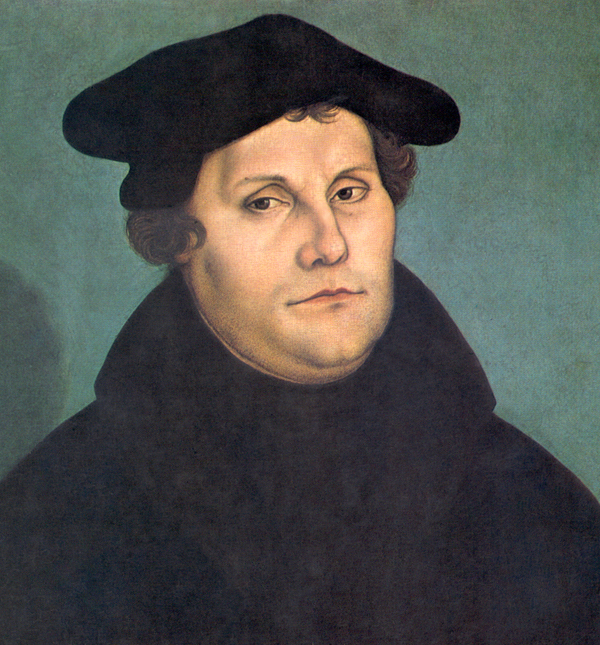The Emperor and the Monk
Charles V and the Diet of Worms: Part 1Guest Post by Clayton Miles Lehman
A Reformation flashpoint and the dawning of a new era in Christian history.
We often read about the Diet of Worms from Reformer Martin Luther's point of view, but what did it look like through the eyes of Charles V? Learn more in this 5-part guest series by Clayton Miles Lehman.

Portrait of Charles V ca 1515 by Bernard van Orley. Museum of Fine Arts, Budapest; Portrait of Martin Luther in 1529 by Lucas Cranach the Elder. Augsburg, St. Anne's Church. Wikimedia Commons / Public Domain.
The young emperor had had a late night, and now as he made his way to the court of his residence, he thought about the hand-written document he carried with him. Of all the intractable matters he faced these months in Worms, the affair of Martin Luther exasperated him most. Charles could not really follow what Luther had said, whether he spoke in High German or Latin, but his advisors explained perfectly well in the emperor’s native French what this obnoxious monk asserted. As he walked to the court, Charles’s thoughts touched on the constant and immediate need to curb the Germans’ attempts to limit the royal and imperial power he had only two years before inherited from his paternal grandfather, the Habsburg emperor Maximilian, thanks to some complicated and expensive negotiations with the imperial electors.
He had depended on his advisors carefully to guide him down the delicate path between the competing interests of cities, princes secular and ecclesiastical, and nobles—now working for a compromise advantageous to all, now playing them against each other in order to enhance imperial and dynastic power. He went on to consider how to give his younger brother Ferdinand a respectable but still subordinate place in the Habsburg system. The Turks threatened the eastern realms that Charles planned to assign to his brother, but as yet not dangerously so. Far more alarming, local rebellion threatened Charles’s Spanish kingdoms, which six years before he had inherited from his other grandfather, Ferdinand of Aragon. And then Charles had to worry about the bellicosity of King Francis, the deviousness of Cardinal Wolsey, and the vacillation of Pope Leo X. The spring of 1521 positioned Charles at the cusp of establishing himself as the universal monarch of Christendom, and in many ways his prospects appeared bright.
On Tuesday, three days earlier, Martin Luther had entered the Imperial Free City of Worms in a triumphal entry better suited to a true defender of Christendom than to a heretic whom the pope had months before condemned and whose books Charles had already ordered burned in the Low Countries. The monk, Charles thought, needed burning, not just his books.
On Wednesday, 17 April 1521, Luther appeared for the first time before the emperor, the electors, and other princes of the empire. He balked at the demand by the presiding officer that he admit to authoring some of the books circulating in his name and recant their errors. Charles consulted the princes and, although annoyed that the clever monk had failed to recant at once, magnanimously agreed to allow Luther a day to consider. The next day, Thursday, Charles and the princes had to spend an unexpectedly long time with other matters, so they did not get to Luther until about six in the evening, two hours after the scheduled time. Despite the crowds, Luther betrayed no doubt, hesitated not in the least. First the representatives of the empire had to listen to him make a long, self-justifying speech.
The presiding office, Dr Johann von der Ecken, finally demanded that Luther respond to the two simple questions, “Did you write these books, and, if so, will you recant their errors?” The monk admitted authorship of the books piled on the table before him, but he refused to accept the judgment of the church, its Holy Father, decisions of the councils—practically all of Christendom. So Charles adjourned the hearing, and while Luther’s supporters escorted him more arrogantly than ever back to his inn, the emperor dined and retired to his chambers.
That night the young man, only twenty-one years old, reflected on his dynastic and religious background: heir of the Catholic Monarchs and Austrian Habsburgs, King of Spain and Emperor of the Holy Roman Empire, enemy of infidel and heretic. His critics had for a long time described him as a tool of his advisors and of the pope, and Charles longed for the opportunity to show himself his own man. Now he had a chance and a reason to do so. A secretary stood by, but—contemporaries emphasized—none of his advisors. Charles dipped pen in ink and began to write.
Part 1 "The Emperor and the Monk"
Part 2 "The Young Emperor's Confession"
Part 3 "The Young Emperor Comes into His Own"
Part 4 "Politics, the French, and the Turks"
Part 5 "Imperial Reforms at the Diet of Worms"
Part 6 "The Edict that Brought No Resolution"
Find more on the Protestant Reformation in Christian History magazine here.
Clayton Lehmann is Professor of History at the University of South Dakota. He has taught and published widely in the history of ancient Greece and Rome and the Early Modern period and in the field of classical reception. His current book project is a critical translation of López de Gómera’s Historia general de las Indias (1552-1555).



